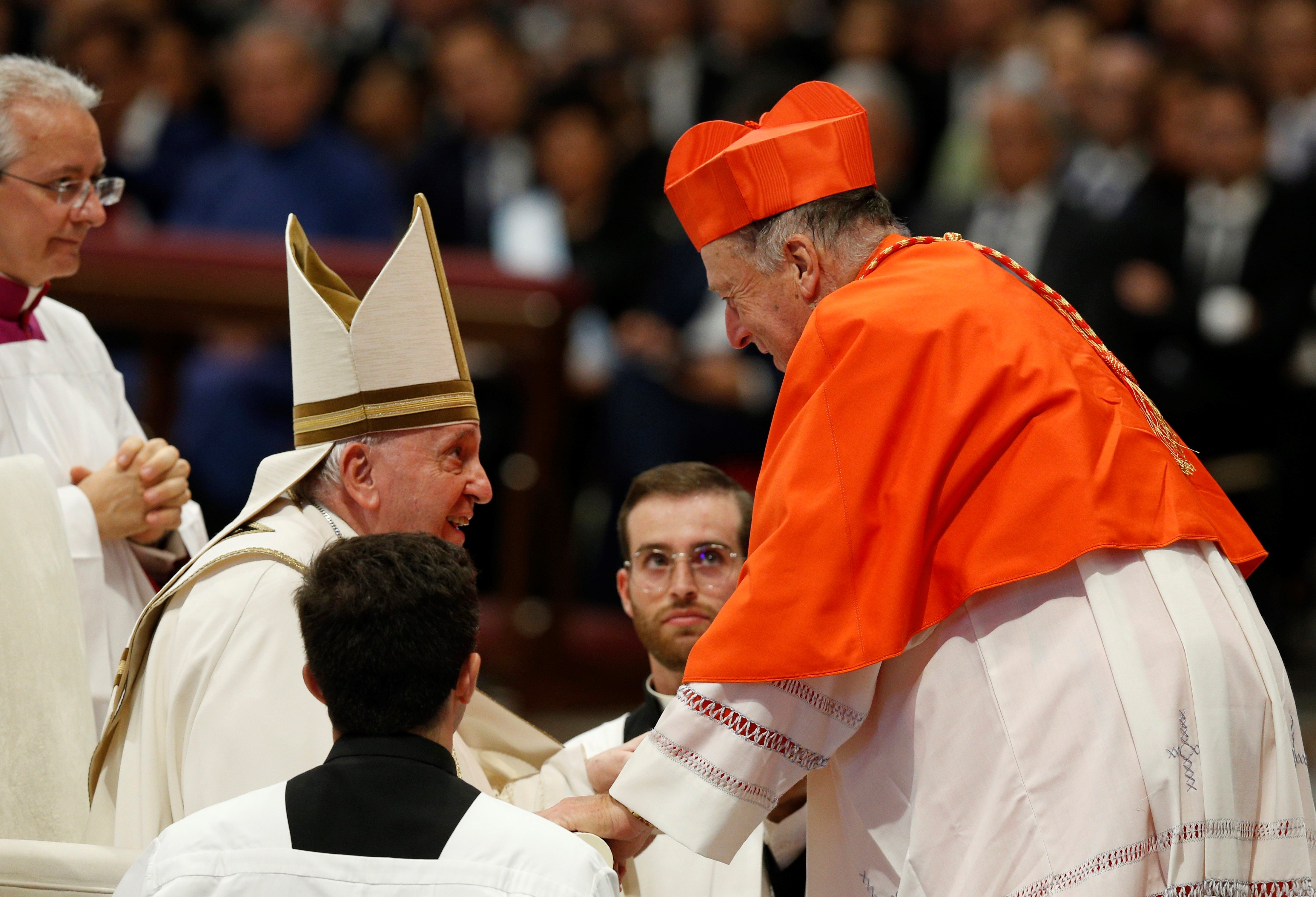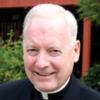
Pope Francis talks with San Diego Cardinal Robert McElroy after presenting the red biretta to him during a consistory for the creation of 20 new cardinals in St. Peter's Basilica at the Vatican Aug. 27, 2022. (CNS/Paul Haring)
As a long-ago moral theology professor of now-Cardinal Robert McElroy, I am leaning on this connection to make a modest contribution to the present substantial support and significant opposition he has received regarding his January article in America magazine on "radical inclusion" for LGBT people, women and others in the Catholic Church. To properly understand McElroy's proposals, it is necessary to situate them in the context of the pastoral ecclesiology and synodal process advocated by Pope Francis.
The pastoral ecclesiology of Pope Francis is the background for McElroy's essay. Francis envisions a consciously expansive church, characterized as a mother that excludes no one. A priority for the church today is to look forward, not backward. Francis' pastoral ecclesiology accentuates what people share rather than what divides us. He preaches mercy, compassion and forgiveness, rather than stern admonishments and condemnations. Charity must prevail in all things. He echoes Pope St. John XXIII: "In essentials, unity; in doubtful matters, liberty; in all things, charity." Francis insists that we must allow ourselves "to be surprised by God."
In Evangelii Gaudium, Francis is calling for a far-reaching "pastoral and missionary conversion of the church in our time," a reexamination of attitudes, structures and church practices in light of their capacity to effectively proclaim the love and mercy of God as shown in the Gospel. Dialogue (synodality) within the church is an essential component of this examination. The pope's vision resonates with the opening lines of Vatican II's Pastoral Constitution on the Church in the Modern World: "The joys and hopes, the grief and anguish of the people of our time, especially whose who are poor or afflicted, are the joys and hopes, the grief and anguish of the followers of Christ."
The two synods on the family (2014 and 2015) addressed a wide range of pastoral issues, among them pastoral care for the divorced and remarried, and those excluded from the sacrament of the Eucharist. These concerns have been longstanding for Francis. He has no desire to reverse the church's teaching on the indissolubility of marriage. Rather, his intention is to root the church's teaching more firmly within the scope of Christian mercy. He would like the church to consider that there are at least some divorced and remarried couples who in situations where renouncing their second marriage would only compound the harm caused by the failure of the first marriage by requiring breaking the current familial commitment. Is it not possible, Francis asks, to find signs of grace and hope in the second marriage and thereby acknowledge the value of the Eucharist for such couples as a "medicine of mercy"?
[Francis] is not advocating a pastoral compromise regarding church teaching, but rather an authentic interpretation of the doctrine as it relates to real human persons and concrete situations.
Francis' hope is to negotiate the tension between the normative claims of church doctrine and the pastoral reality. He refuses to see doctrine and pastoral practice as mutually exclusive options and simply resolve ecclesiological tensions prematurely. In his address at the conclusion of the Extraordinary Synod on the Family in October 2014, he warned against "a temptation to hostile inflexibility, that is, wanting to close oneself within the written word … and not allowing oneself to be surprised by God… From the time of Christ, it is the temptation of the zealous, of the scrupulous, of the solicitous and of the so-called – today – 'traditionalists' and also of the intellectuals."
His point is clearly made when he addressed the text of Humanae Vitae: "The object is not to change the doctrine, but it is a matter of going into the issue in depth and to ensure that the pastoral ministry takes into account the situations of each person and what that person can do." He desires that the church and confessors "be very generous" in dealing with individual couples' "pastoral situations."
He is not advocating a pastoral compromise regarding church teaching, but rather an authentic interpretation of the doctrine as it relates to real human persons and concrete situations. His desire might be fulfilled by the church moving beyond a narrow analysis of an act to consider the entirety of the human person and the context. Pope Francis is calling the church to meet people "in the streets," ministering to their concerns and attending to their wounds. He is calling for a "pastoral connaturality," as theologian Richard Gaillardetz terms it, to discern how the church's doctrine can best be employed to exemplify God's solidarity with the poor and suffering and be generous with the mercy of God.
The emphasis on mercy is the hallmark of the Francis papacy. His naming of the church as a "field hospital" is especially addressed to priests who must be men of mercy and compassion, close to his people and a servant of all. "Whoever is wounded in life, in whatever way, can find in him attention and a sympathetic ear," he told parish priests in Rome in 2014.
San Diego Cardinal Robert McElroy's closing plenary Jan. 28 at the two-day conference "Re-Imagining the World: Saint Francis and Pope Francis" called Francis' worldwide process of synodal consultation is a "call to conversion to the whole church." (Courtesy of University of San Diego/Catherine Ingle)
Francis is convinced that God's "justice as mercy" is core to Christian life expressed in the outpouring of unmerited mercy and tenderheartedness as embodied in the life and ministry of Jesus, the Good Shepherd. This reality mandates that the church and all of us are particularly neighbors to those who are suffering or marginalized, those who society excludes, exploits or views as worthless or expendable, those who are vulnerable. Every Christian is called to be an instrument of God to these our neighbors.
Francis' pastoral ecclesiology now places us in a better position to understand McElroy's "radical inclusion," both in his original article and a response to critics in March. He roots his comments in the synodal working document, “Enlarge the Space of Your Tent,” which calls for "radical inclusion, shared belonging and deep hospitality according to the teachings of Jesus." This outlook must move us from Babel to Pentecost, demanding that we see our sisters and brothers as common pilgrims on the journey of life, systematically bringing "the peripheries into the center of life in the church."
McElroy highlights marginalized people who "because of circumstances in their own lives are experienced as impediments to full participation in the life of the church," giving as two examples: those who divorced and remarried without a declaration of nullity, and members of the LGBT community. Following Francis' pastoral ecclesiology, McElroy opines that these people must first be moved from the marginalized to the included through a careful pastoral pedagogy of discerning accompaniment. The primary pastoral imperative is to heal the wounded by way of sustained inclusion.
Advertisement
Part of this inclusion necessitates an embrace of Francis' exhortation to see the Eucharist as "not a prize for the perfect but a powerful medicine and nourishment for the weak." This pastoral exigency calls on the church to revisit its eucharistic theology so that all the baptized are invited to the table of the Lord. In addition, it also calls for rethinking the longstanding moral teaching of the church that all sexual sins outside marriage are always gravely evil (instrinsice malum) and as such constitute actions that sever a believer's relationship with God.
McElroy bases his synodal conversation of critical points in the teaching of Francis. We are all wounded by sin and equally in need of God's grace and healing. Through pastoral discernment the church helps people to form a correct conscience and then accompany people in their judgment of conscience. And the Eucharist is a profound grace in our gradual conversion to discipleship, coupled with the grace of the sacrament of penance.
McElroy echoes Francis in calling for a pastoral church that flows from the imitatio Christi. Bergoglio described this ecclesiology in his pre-conclave address to the meetings of cardinals: The only mission of the church is to be like the moon (mysterium lunae) reflecting the greater Light who is Christ.




